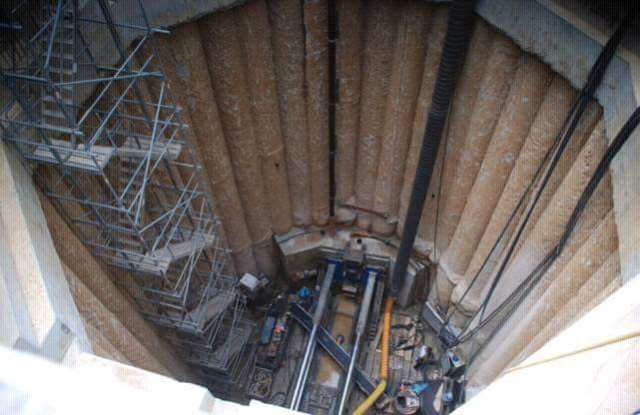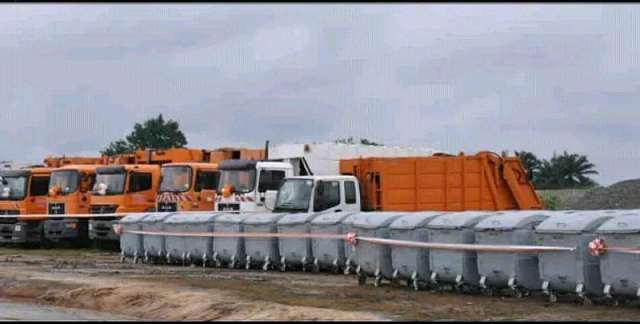Spotlight On The Achievements Of The Akwa Ibom State Ministry Of Environment And Mineral Resources Under Prince Enobong Uwah

Friday, May 29, 2015 will officially signal the end of Governor Godswill Akpabio-led administration. Ordinary, it is expected that by now different public officers, government parastatals and ministries under the present state government would be taking stock in order to help the public make an unbiased assessment of their performance within their time of service. Whether these government representatives have come to terms with this fact or not, the need for the public to have the account of their stewardship is a must. It was on this premise that TEAM E4+ launched "OPERATION PRESENT YOUR SCORECARD".
For the record, the much touted 'uncommon transformation' of the present state government is a product of the combined efforts of different government ministries, commissions, boards and other parastatals though under the overall command of the state governor. To this end, kudos must be given to these bodies which, amidst diverse challenges, have contributed immensely to the success of the state government. There is no gainsaying that the current developmental strides witnessed in the state were made possible through the efficiency, effectiveness and sincerity of some government bodies. Undoubtedly, one of such bodies is the State Ministry of Environment and Mineral Resources.
Led by a pragmatic, focused, and result-oriented chief servant in the person of Prince Enobong Uwah, the Environment Ministry in the last few years has confronted some daring challenges and environmental disasters in its bid to effectively serve the state and her people. Some of these challenges include flood, erosion, oil spill, refuse/waste control and so on. The oil boom and increased activities of oil multinationals in the state in recent years have exposed the oil producing areas of the state to series of environmental hazards but kudos to the Environment Ministry such cases have been effectively managed and reduced to the barest minimum.
One of the highpoints of this Ministry's performance was its prompt response to the 2012 flood that ravaged the state along with other states in the country. Apart from setting up a flood control unit in the ministry which was saddled with the responsibility of processing all flood related reports to enable quick response and carrying out evacuation exercises in flood prone areas to prevent more cases, it is on record that the Environment Commissioner, Prince Uwah personally visited many areas that were hit by flood to have a firsthand information. Perhaps, the effectiveness of the Prince Enobong Uwah-led Environment Ministry towards managing the 2012 flood incident fully paid off when the federal government categorized the state among the least hit.
A report on ThisDay reads "According to the president the provision of the national flood relief fund to the states and the FCT is in four categories. Oyo, Kogi, Benue, Plateau, Adamawa, Delta, Bayelsa and Anambra are Category A states. Category B include: Jigawa, Kano, Bauchi, Kaduna, Niger, Nasarawa, Taraba, Cross River, Edo, Lagos and Imo States. In Category C are: Kwara, Katsina, Gombe, Ogun, Ondo, Ebonyi, Abia and Rivers; while Category D states include, Sokoto, Kebbi, Zamfara, Yobe, Enugu, Ekiti, Osun, Akwa Ibom, Borno and Federal Capital Territory".
Another achievement of the Ministry which is worthy of note is the daunting task of giving the state a serene look. Suffice to say that this is one task which has kept the Prince Uwah-led Environment Ministry on its toes in the last couple of years. Until Prince Uwah assumed office as the State Environment Commissioner, solid waste management was one of the greatest challenges facing environmental agencies in the state. Solid waste management was simply reduced to waste transfer with overflow dump sites causing serious environmental pollution. Waste management practices were characterized by inefficient collection and poor disposal methods. Hence, in order to effectively manage waste/refuse in the state, the Ministry had to think out of the box and introduce some hygienic and environment friendly yet very effective and proactive measures.
A look at the summary of its achievement reveals that some of the waste management measures introduced by the Ministry include; engaging Resource Persons from tested companies to handle different aspects of waste management, air pollution and sanitation; procurement of smoke free Bluetech environment-friendly compactors and receptacles for waste disposal and building of a modern waste management complex. Perhaps, out of oversight, there have been instances where receptacles are not emptied on time, causing overflow and littering of refuse, but as recently revealed, the Honourable Commissioner has always ensured a quick response when such is brought to his knowledge. According to him, "Uyo has become the tourism destination of choice as the process has been instituted whereby pay loaders, compactors and tippers daily evacuate refuse in all parts of the city and this has made it wear a new look as its cleanliness is not in doubt".
However, it must be put on record that members of the public should take a share of the blame for the continuous waste management challenges in the state owing to their poor and improper waste disposal. As recently pointed by the Commissioner, in many cases, the receptacles are barely filled yet people will deliberately throw their refuse on the ground rather than depositing them inside the receptacles. This improper conduct contributes immensely to the incessant littering of waste and it undermines the efforts of the Ministry in waste management. This is where members of the public on their part have failed in the task of ensuring a safe environment.
Furthermore, the Ministry within the last few years has partnered various bodies with the overall aim of safeguarding the environment. For instance, on June 5, 2013, the Environment Ministry in partnership with ExxonMobil, launched The Ibom Programme on Environmental Awareness (IPEA). It was gathered that the initiative was aimed at creating awareness on pollution, and helping the citizens of Akwa Ibom state develop positive environmental values that will enable them manage instances of environmental pollution that may occur, as well as prevent potential environmental hazards from happening. This and many other similar partnerships have contributed to the success recorded by the present Ministry of Environment.
According to Prince Uwah, other strides so far recorded in the environment sector include; establishment of the Green Brigade – a standing environmental sanitation corps employing over 2,500 citizens (with over 1,500 women) engaged in desilting gutters and drainages in the state, mowing the lawns, trimming flowers, sweeping the streets, refuse collection, evacuation and management; engaging oil companies operating in the state to sign memorandum of understanding with their host communities in a bid to ensure conductive working and peaceful environment and conducting engineering studies and design of anti-ravine facilities for the control of Uyo ravines is in progress with the control facilities for the control of Eka and Asutan Street ravines already completed.
On flood control, the Ministry has ensured that flood control project at Nwaniba Road-Ewet Timber Market –Uruan Street and its environs has progressed to over 95% completion while Nkemba trough; culverts at Uruan Street/Oron road; and the underground drains from Udotung Ubo with its outlet at Dominic Utuk avenue have been desilted for the first time since its construction. According to the Environment Commission, "this has been very effective in the reduction of the impact of flood in areas mentioned". With these and many other achievements, the State Ministry of Environment and Mineral Resources under Prince Enobong Uwah has stood very high in terms of performance.
However, Prince Uwah has refused to take the credit for his Ministry's achievements. According to him, the achievements are clear evidence of the commitment of state government under Chief Godswill Akpabio towards safeguarding the environment for the people. Hear him;
"One major commitment of the Akpabio administration is safeguarding the environment for the healthy living of the people, which has led to the construction of a-N13.8b underground erosion control project for the State capital. Safeguarding the environment for a healthy living of the people is a commitment of the State government. In order to facilitate Environmental Management and waste disposal services, government has employed the services of renowned and professional Resource Persons and Consultants in this area".



